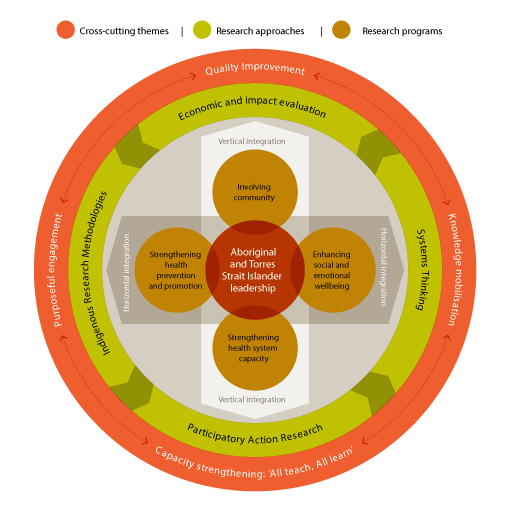BACKGROUND
STRIDE is funded by the National Health and Medical Research Council (NHMRC) from 2020 – 2024 and is administered by the University Centre for Rural Health, The University of Sydney.
STRIDE involves leading researchers from across Australia with expertise in health systems and quality improvement (QI) research, participatory action research, Indigenous methodologies, epidemiology, public health, health and social policy. The Investigator team has outstanding national and international reputations and track records, which reflects our commitment to upholding Indigenous leadership (50% of our Investigators identify as Aboriginal and/or Torres Strait Islander); building research capacity (40% of Chief Investigators are exemplary emerging researchers); and improving gender equity in research (90% of Chief Investigators are women).
In over two decades of collaborative research, we have built a diverse network that includes more than 360 individuals from 85 primary health care services and other institutions across NSW, QLD, NT, VIC, WA and SA. Over time, we have responded to the emergent needs of the health sector and the communities they serve; seeking to advance research and practice of quality improvement for health system strengthening that pursues the Alma Ata and recent Astana vision of comprehensive primary healthcare for Indigenous communities.
Our research approach is based on growing evidence of the importance of community-driven, culture-strengthening interventions in Indigenous primary health care settings. Our way of working puts the strengths, needs and aspirations of Indigenous people at the centre of the research process informed by methodologies that reflect Indigenous ways of knowing, being and doing and advance international Indigenous scholarship.
STRIDE’s vision is equitable health care for Aboriginal and Torres Strait Islander peoples. Through quality improvement (QI) and collaborative implementation research, we are aiming to strengthen primary healthcare (PHC) and its interconnections to broader systems that impact on health and wellbeing.
WORK PROGRAM
Our main program areas for achieving this vision include:
1. Enhancing community engagement;
2. Strengthening QI processes within PHC systems;
By extending QI processes and collaborations across sectors to promote holistic health outcomes recognising the importance of social and cultural determinants of health and wellbeing:
3. Improving social and emotional wellbeing; and
4. Health promotion and disease prevention.
Four cross-cutting themes of our research:
a. Purposeful engagement of community and practitioners in research;
b. Reciprocal Learning approach to capacity strengthening;
c. Knowledge mobilisation; and
d. Economic and impact evaluation.
We will adopt Indigenous methodologies, participatory action research, and systems thinking approaches to generating new knowledge.
Background
Key Principles & Ways of Working
Research Methodologies & Frameworks
